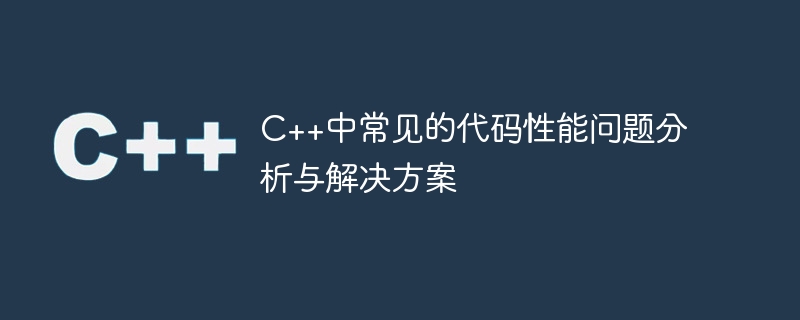

Analysis and solutions to common code performance problems in C
Introduction:
In the C development process, optimizing code performance is a very important task . Performance issues can cause programs to run slowly, waste resources, or even crash. This article will detail common code performance issues in C and provide corresponding solutions. At the same time, specific code examples will also be given so that readers can better understand and apply them.
1. Memory management issues
Solution:
Use smart pointers (such as std::shared_ptr, std::unique_ptr) to manage dynamically allocated memory, so that the memory can be automatically released and avoid memory leaks.
Sample code:
// 使用std::unique_ptr管理动态分配的内存 std::unique_ptrp(new int); *p = 10; // 不需要手动释放内存,unique_ptr会在作用域结束时自动释放
Solution:
Use reference, pointer or move semantics to avoid unnecessary memory copies. You can use const references to pass parameters to avoid creating temporary copies.
Sample code:
// 不合理的内存拷贝 std::string foo(std::string str) { return str; // 产生一次额外的拷贝 } // 合理的内存传递 void bar(const std::string& str) { // 通过引用传递参数,避免拷贝 }
2. Algorithm and data structure issues
Solution:
Choose the appropriate algorithm based on specific needs. The merits of the algorithm can be evaluated through time complexity and space complexity, and the algorithm with higher efficiency can be selected.
Sample code:
// 不合理的算法选择 for (int i = 0; i < n; i++) { for (int j = i+1; j < n; j++) { // ... } } // 合理的算法选择 for (int i = 0; i < n; i++) { // ... }
Solution:
Choose the appropriate data structure according to specific needs. For example, if you need frequent insertion and deletion operations, you can choose a linked list; if you need fast search operations, you can choose a hash table or balanced binary tree.
Sample code:
// 低效的数据结构选择 std::vectorvec; for (int i = 0; i < n; i++) { vec.push_back(i); // 每次插入都会导致内存的重新分配 } // 高效的数据结构选择 std::list lst; for (int i = 0; i < n; i++) { lst.push_back(i); // 链表的插入操作效率较高 }
3. Function calling issues
Solution:
Reduce the number of function calls as much as possible. Some simple calculations or operations can be placed directly at the calling site to avoid the overhead of function calls.
Sample code:
// 过多的函数调用 int add(int a, int b) { return a + b; } int result = 0; for (int i = 0; i < n; i++) { result += add(i, i+1); // 每次循环都会产生一次函数调用的开销 } // 减少函数调用 int result = 0; for (int i = 0; i < n; i++) { result += i + (i+1); // 直接在调用处进行计算,避免函数调用开销 }
Solution:
You can use static polymorphism (template) to replace virtual functions to avoid the overhead of virtual functions.
Sample code:
// 虚函数带来的性能损耗 class Base { public: virtual void foo() { /* ... */ } }; class Derived : public Base { public: void foo() override { /* ... */ } }; void bar(Base& obj) { obj.foo(); // 虚函数调用的开销 } Derived d; bar(d); // 避免虚函数的性能损耗 template void bar(T& obj) { obj.foo(); // 静态多态的调用,避免虚函数开销 } Derived d; bar(d);
Summary:
This article introduces common code performance problems in C and provides corresponding solutions. It involves memory management issues, algorithm and data structure issues, and function calling issues. Through reasonable selection of data structures, algorithms, and optimization of function calls, the performance of C code can be improved and help the program's operating efficiency and resource utilization. I hope this article can inspire and help readers with the performance optimization issues they encounter in C development.
The above is the detailed content of Analysis and solutions to common code performance problems in C++. For more information, please follow other related articles on the PHP Chinese website!
 What are the differences between c++ and c language
What are the differences between c++ and c language Recommended learning order for c++ and python
Recommended learning order for c++ and python Cost-effectiveness analysis of learning python and c++
Cost-effectiveness analysis of learning python and c++ Is c language the same as c++?
Is c language the same as c++? Which is better to learn first, c language or c++?
Which is better to learn first, c language or c++? The difference and connection between c language and c++
The difference and connection between c language and c++ C++ software Chinese change tutorial
C++ software Chinese change tutorial Cost-effectiveness analysis of learning python, java and c++
Cost-effectiveness analysis of learning python, java and c++



